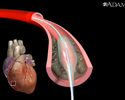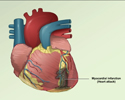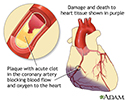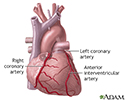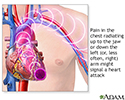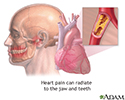Heart attack
Myocardial infarction; MI; Acute MI; ST - elevation myocardial infarction; Non-ST - elevation myocardial infarction; NSTEMI; CAD - heart attack; Coronary artery disease - heart attack
Most heart attacks are caused by a blood clot that blocks one of the coronary arteries. The coronary arteries bring blood and oxygen to the heart. If the blood flow is blocked, the heart is starved of oxygen and heart cells die.
The medical term for this is myocardial infarction.
Causes
A substance called plaque can build up in the walls of your coronary arteries. This plaque is made up of cholesterol and other cells.
A heart attack may occur when:
- A tear in the plaque occurs. This triggers blood platelets and other substances to form a blood clot at the site that blocks most or all of the oxygen-carrying blood from flowing to a part of the heart muscle. This is the most common cause of heart attack.
- A slow buildup of plaque may narrow one of the coronary arteries so that it is almost blocked.
In either case, there is not enough blood flow to the heart muscle and heart muscle dies.
The cause of heart attack is not always known.
Heart attack may occur:
- When you are resting or asleep
- After a sudden increase in physical activity
- When you are active outside in cold weather
- After sudden, severe emotional or physical stress, including an illness
Many risk factors may lead to the development of plaque buildup and a heart attack .
Risk factors may lead to the developmen...
Heart disease - prevention; CVD - risk factors; Cardiovascular disease - risk factors; Coronary artery disease - risk factors; CAD - risk factors...
Symptoms
A heart attack is a medical emergency. If you have symptoms of a heart attack, call 911 or your local emergency number right away.
- DO NOT try to drive yourself to the hospital.
- DO NOT WAIT. You are at greatest risk of sudden death in the early hours of a heart attack.
Chest pain is the most common symptom of a heart attack.
Chest pain
Chest pain is discomfort or pain that you feel anywhere along the front of your body between your neck and upper abdomen.

- You may feel the pain in only one part of your body OR
- Pain may move from your chest to your arms, shoulder, neck, teeth, jaw, belly area, or back
The pain can be severe or mild. It can feel like:
- A tight band around the chest
-
Bad indigestion
Bad indigestion
Indigestion (dyspepsia) is a mild discomfort in the upper belly or abdomen. It occurs during or right after eating. It may feel like:Heat, burning,...
 ImageRead Article Now Book Mark Article
ImageRead Article Now Book Mark Article - Something heavy sitting on your chest
- Squeezing or heavy pressure
The pain most often lasts longer than 20 minutes. Rest and a medicine to relax the blood vessels (called nitroglycerin) may not completely relieve the pain of a heart attack. Symptoms may also go away and come back.
Other symptoms of a heart attack can include:
-
Anxiety
Anxiety
Stress is a feeling of emotional or physical tension. It can come from any event or thought that makes you feel frustrated, angry, or nervous. Stres...
 ImageRead Article Now Book Mark Article
ImageRead Article Now Book Mark Article -
Cough
Cough
Coughing is an important way to keep your throat and airways clear. But too much coughing may mean you have a disease or disorder. Some coughs are d...
 ImageRead Article Now Book Mark Article
ImageRead Article Now Book Mark Article -
Fainting
Fainting
Fainting is a brief loss of consciousness due to a drop in blood flow to the brain. The episode most often lasts less than a couple of minutes and y...
Read Article Now Book Mark Article -
Lightheadedness, dizziness
Lightheadedness, dizziness
Dizziness is a term that is often used to describe 2 different symptoms: lightheadedness and vertigo. Lightheadedness is a feeling that you might fai...
 ImageRead Article Now Book Mark Article
ImageRead Article Now Book Mark Article -
Nausea and vomiting
Nausea and vomiting
Nausea is feeling an urge to vomit. It is often called "being sick to your stomach. "Vomiting or throwing-up is forcing the contents of the stomach ...
 ImageRead Article Now Book Mark Article
ImageRead Article Now Book Mark Article - Palpitations (feeling like your heart is beating too fast or irregularly)
-
Shortness of breath
Shortness of breath
Breathing difficulty may involve:Difficult breathingUncomfortable breathingFeeling like you are not getting enough air
 ImageRead Article Now Book Mark Article
ImageRead Article Now Book Mark Article -
Sweating
, which may be very heavy
Sweating
Sweating is the release of liquid from the body's sweat glands. This liquid contains salt. This process is also called perspiration. Sweating helps...
 ImageRead Article Now Book Mark Article
ImageRead Article Now Book Mark Article
Some people (the older adults, people with diabetes, and women) may have little or no chest pain. Or, they may have unusual symptoms such as shortness of breath, fatigue, and weakness. A "silent heart attack" is a heart attack with no symptoms.
Exams and Tests
A health care provider will perform a physical exam and listen to your chest using a stethoscope.
-
The provider may hear abnormal sounds in your lungs (called crackles), a
heart murmur
, or other abnormal sounds.
Heart murmur
A heart murmur is a blowing, whooshing, or rasping sound heard during a heartbeat. The sound is caused by turbulent (rough) blood flow through the h...
 ImageRead Article Now Book Mark Article
ImageRead Article Now Book Mark Article - You may have a fast or uneven pulse.
- Your blood pressure may be normal, high, or low.
You will have an electrocardiogram (ECG) to look for heart damage. Most of the time, certain changes on the ECG indicate you are having a heart attack. Sometimes these changes are not present, even though other tests indicate you have had a heart attack. This can be called non-ST elevation myocardial infarction (NSTEMI).
Electrocardiogram (ECG)
An electrocardiogram (ECG) is a test that records the electrical activity of the heart.

A blood test can show if you have heart tissue damage. This test can confirm that you are having a heart attack. You will likely have this test 3 times over the first 6 to 12 hours.
Blood test
A troponin test measures the levels troponin T or troponin I proteins in the blood. These proteins are released when the heart muscle has been damag...
Coronary angiography may be done right away or when you are more stable.
Coronary angiography
Coronary angiography is a procedure that uses a special dye (contrast material) and x-rays to see how blood flows through the arteries in your heart....

- This test uses a special dye and x-rays to see how blood flows through your heart.
- It can help your doctor decide which treatments you need next.
Other tests to look at your heart that may be done while you are in the hospital:
-
Echocardiography
with or with stress testing
Echocardiography
An echocardiogram is a test that uses sound waves to create pictures of the heart. The picture and information it produces is more detailed than a s...
 ImageRead Article Now Book Mark Article
ImageRead Article Now Book Mark Article -
Exercise stress test
Exercise stress test
An exercise stress test is used to measure the effect of exercise on your heart.
Read Article Now Book Mark Article -
Nuclear stress test
Nuclear stress test
Thallium stress test is a nuclear imaging method that shows how well blood flows into the heart muscle, both at rest and during activity.
 ImageRead Article Now Book Mark Article
ImageRead Article Now Book Mark Article -
Heart CT scan
or
heart MRI
Heart CT scan
A computed tomography (CT) scan of the heart is an imaging method that uses x-rays to create detailed pictures of the heart and its blood vessels. Th...
 ImageRead Article Now Book Mark Article
ImageRead Article Now Book Mark ArticleHeart MRI
Heart magnetic resonance imaging is an imaging method that uses powerful magnets and radio waves to create pictures of the heart. It does not use ra...
 ImageRead Article Now Book Mark Article
ImageRead Article Now Book Mark Article
Treatment
IMMEDIATE TREATMENT
- You will be hooked up to a heart monitor, so the health care team can see how regularly your heart is beating.
- You will receive oxygen so that your heart doesn't have to work as hard.
- An intravenous line (IV) will be placed into one of your veins. Medicines and fluids pass through this IV.
- You may get nitroglycerin and morphine to help reduce chest pain.
- You may receive aspirin, unless it would not be safe for you. In that case, you will be given another medicine that prevents blood clots.
-
Dangerous abnormal heartbeats (
arrhythmias
) may be treated with medicine or electric shocks.
Arrhythmias
An arrhythmia is a disorder of the heart rate (pulse) or heart rhythm. The heart can beat too fast (tachycardia), too slow (bradycardia), or irregul...
 ImageRead Article Now Book Mark Article
ImageRead Article Now Book Mark Article
EMERGENCY PROCEDURES
Angioplasty is a procedure to open narrowed or blocked blood vessels that supply blood to the heart.
Angioplasty
Angioplasty is a procedure to open narrowed or blocked blood vessels that supply blood to the heart. These blood vessels are called the coronary art...

- Angioplasty is often the first choice of treatment. It should be done within 90 minutes after you get to the hospital, and usually no later than 12 hours after a heart attack.
- A stent is a small, metal mesh tube that opens up (expands) inside a coronary artery. A stent is usually placed after or during angioplasty. It helps prevent the artery from closing up again.
You may be given drugs to break up the clot. This is called thrombolytic therapy . It is best if these drugs are given soon after the onset of symptoms, usually no later than 12 hours after it and ideally within 30 minutes of arriving to the hospital.
Thrombolytic therapy
Small blood vessels called coronary arteries supply blood and oxygen to the heart. A heart attack can occur if a blood clot stops the flow of blood t...
Some people may also have heart bypass surgery to open narrowed or blocked blood vessels that supply blood to the heart. This procedure is also called coronary artery bypass grafting and/or open heart surgery .
Open heart surgery
Heart surgery is any surgery done on the heart muscle, valves, arteries, or the aorta and other large arteries connected to the heart. The term "ope...

TREATMENT AFTER A HEART ATTACK
After several days, you will be discharged from the hospital.
Discharged from the hospital.
Myocardial infarction - discharge; MI - discharge; Coronary event - discharge; Infarct - discharge; Acute coronary syndrome - discharge; ACS - discha...

You will likely need to take medicines, some for the rest of your life. Always talk to your provider before stopping or changing how you take any medicines. Stopping certain medicines can be deadly.
While under the care of your health care team, you will learn:
- How to take medicines to treat your heart problem and prevent more heart attacks
- How to eat a heart-healthy diet
-
How to be
active and exercise safely
Active and exercise safely
Heart attack - activity; MI - activity; Myocardial infarction - activity; Caridiac rehabilitation - activity; ACS - activity; NSTEMI - activity; Acut...
 ImageRead Article Now Book Mark Article
ImageRead Article Now Book Mark Article - What to do when you have chest pain
- How to stop smoking
Strong emotions are common after a heart attack.
- You may feel sad
- You may feel anxious and worry about being careful about everything you do
All of these feelings are normal. They go away for most people after 2 or 3 weeks.
You may also feel tired when you leave the hospital to go home.
Most people who have had a heart attack take part in a cardiac rehabilitation program.
Support Groups
Many people benefit from taking part in support groups for people with heart disease .
Support groups for people with heart di...
The following organizations are good resources for information on heart disease:American Heart Association -- www. heart. orgCenters for Disease Cont...

Outlook (Prognosis)
After a heart attack, you have a higher chance of having another heart attack.
How well you do after a heart attack depends on several factors such as:
- The amount of damage to your heart muscle and heart valves
- Where that damage is located
- Your medical care after the heart attack
If your heart can no longer pump blood out to your body as well as it used to, you may develop heart failure . Abnormal heart rhythms can occur, and they can be life threatening.
Heart failure
Heart failure is a condition in which the heart is no longer able to pump oxygen-rich blood to the rest of the body efficiently. This causes symptom...

Most people can slowly go back to normal activities after a heart attack. This includes sexual activity. Talk to your provider about how much activity is good for you.
References
Amsterdam EA, Wenger NK, Brindis RG, et al. 2014 AHA/ACC guideline for the management of patients with non-ST-elevation acute coronary syndromes: a report of the American College of Cardiology/American Heart Association Task Force on Practice Guidelines. J Am Coll Cardiol . 2014;64(24):e139-e228. PMID: 25260718 www.ncbi.nlm.nih.gov/pubmed/25260718 .
Anderson JL. ST segment elevation acute myocardial infarction and complications of myocardial infarction. In: Goldman L, Schafer AI, eds. Goldman's Cecil Medicine . 25th ed. Philadelphia, PA: Elsevier Saunders; 2016:chap 73.
O'Gara PT, Kushner FG, Ascheim DD, et al. 2013 ACCF/AHA guideline for the management of ST-elevation myocardial infarction: a report of the American College of Cardiology Foundation/American Heart Association Task Force on Practice Guidelines. J Am Coll Cardiol . 2013;61(4):485-510. PMID: 23256913 www.ncbi.nlm.nih.gov/pubmed/23256913 .
Scirica BM, Morrow DA. ST-elevation myocardial infarction. In: Mann DL, Zipes DP, Libby P, Bonow RO, Braunwald E, eds. Braunwald's Heart Disease: A Textbook of Cardiovascular Medicine . 10th ed. Philadelphia, PA: Elsevier Saunders; 2014:chap 51.
-
Balloon angioplasty - short segment
Animation
-
Heart attack (myocardial infarction) overview
Animation
-
Heart, section through the middle - illustration
The interior of the heart is composed of valves, chambers, and associated vessels.
Heart, section through the middle
illustration
-
Heart, front view - illustration
The external structures of the heart include the ventricles, atria, arteries and veins. Arteries carry blood away from the heart while veins carry blood into the heart. The vessels colored blue indicate the transport of blood with relatively low content of oxygen and high content of carbon dioxide. The vessels colored red indicate the transport of blood with relatively high content of oxygen and low content of carbon dioxide.
Heart, front view
illustration
-
Progressive build-up of plaque in coronary artery - illustration
Plaque may build-up in a coronary artery at the site of a tear in the lining of the vessel.
Progressive build-up of plaque in coronary artery
illustration
-
Acute MI - illustration
A heart attack or acute myocardial infarction (MI) occurs when one of the arteries that supplies the heart muscle becomes blocked. Blockage may be caused by spasm of the artery or by atherosclerosis with acute clot formation. The blockage results in damaged tissue and a permanent loss of contraction of this portion of the heart muscle.
Acute MI
illustration
-
Post myocardial infarction ECG wave tracings - illustration
Various phases can be seen through ECG wave tracings following a heart attack: Hyperacute phase begins immediately after a heart attackFully evolved phase starts a few hours to days after a heart attackResolution phase appears a few weeks after a heart attackStabilized chronic phase is the last phase and typically has permanent pathological changes compared to a normal ECG tracing Hyperacute phase begins immediately after a heart attack Fully evolved phase starts a few hours to days after a heart attack Resolution phase appears a few weeks after a heart attack Stabilized chronic phase is the last phase and typically has permanent pathological changes compared to a normal ECG tracing
Post myocardial infarction ECG wave tracings
illustration
-
Posterior heart arteries - illustration
The coronary arteries supply blood to the heart muscle. The right coronary artery supplies both the left and the right heart; the left coronary artery supplies the left heart.
Posterior heart arteries
illustration
-
Anterior heart arteries - illustration
The coronary arteries supply blood to the heart muscle. The right coronary artery supplies both the left and the right heart; the left coronary artery supplies the left heart.
Anterior heart arteries
illustration
-
Heart attack symptoms - illustration
Symptoms of a possible heart attack include chest pain and pain that radiates down the shoulder and arm. Some people (older adults, people with diabetes, and women) may have little or no chest pain. Or, they may experience unusual symptoms (shortness of breath, fatigue, weakness). Women are more likely than men to have symptoms of nausea, vomiting, back or jaw pain, and shortness of breath with chest pain.
Heart attack symptoms
illustration
-
Jaw pain and heart attacks - illustration
Pain from a heart attack may sometimes radiate to the jaw and teeth. Chest pain is a major symptom of heart attack, but other symptoms such as weakness, shortness of breath, nausea, or vomiting may also occur.
Jaw pain and heart attacks
illustration
-
Balloon angioplasty - short segment
Animation
-
Heart attack (myocardial infarction) overview
Animation
-
Heart, section through the middle - illustration
The interior of the heart is composed of valves, chambers, and associated vessels.
Heart, section through the middle
illustration
-
Heart, front view - illustration
The external structures of the heart include the ventricles, atria, arteries and veins. Arteries carry blood away from the heart while veins carry blood into the heart. The vessels colored blue indicate the transport of blood with relatively low content of oxygen and high content of carbon dioxide. The vessels colored red indicate the transport of blood with relatively high content of oxygen and low content of carbon dioxide.
Heart, front view
illustration
-
Progressive build-up of plaque in coronary artery - illustration
Plaque may build-up in a coronary artery at the site of a tear in the lining of the vessel.
Progressive build-up of plaque in coronary artery
illustration
-
Acute MI - illustration
A heart attack or acute myocardial infarction (MI) occurs when one of the arteries that supplies the heart muscle becomes blocked. Blockage may be caused by spasm of the artery or by atherosclerosis with acute clot formation. The blockage results in damaged tissue and a permanent loss of contraction of this portion of the heart muscle.
Acute MI
illustration
-
Post myocardial infarction ECG wave tracings - illustration
Various phases can be seen through ECG wave tracings following a heart attack: Hyperacute phase begins immediately after a heart attackFully evolved phase starts a few hours to days after a heart attackResolution phase appears a few weeks after a heart attackStabilized chronic phase is the last phase and typically has permanent pathological changes compared to a normal ECG tracing Hyperacute phase begins immediately after a heart attack Fully evolved phase starts a few hours to days after a heart attack Resolution phase appears a few weeks after a heart attack Stabilized chronic phase is the last phase and typically has permanent pathological changes compared to a normal ECG tracing
Post myocardial infarction ECG wave tracings
illustration
-
Posterior heart arteries - illustration
The coronary arteries supply blood to the heart muscle. The right coronary artery supplies both the left and the right heart; the left coronary artery supplies the left heart.
Posterior heart arteries
illustration
-
Anterior heart arteries - illustration
The coronary arteries supply blood to the heart muscle. The right coronary artery supplies both the left and the right heart; the left coronary artery supplies the left heart.
Anterior heart arteries
illustration
-
Heart attack symptoms - illustration
Symptoms of a possible heart attack include chest pain and pain that radiates down the shoulder and arm. Some people (older adults, people with diabetes, and women) may have little or no chest pain. Or, they may experience unusual symptoms (shortness of breath, fatigue, weakness). Women are more likely than men to have symptoms of nausea, vomiting, back or jaw pain, and shortness of breath with chest pain.
Heart attack symptoms
illustration
-
Jaw pain and heart attacks - illustration
Pain from a heart attack may sometimes radiate to the jaw and teeth. Chest pain is a major symptom of heart attack, but other symptoms such as weakness, shortness of breath, nausea, or vomiting may also occur.
Jaw pain and heart attacks
illustration
-
Heart attack and acute coronary syndrome
(In-Depth)
-
Myocardial infarction
(Alt. Medicine)
Review Date: 4/20/2015
Reviewed By: Michael A. Chen, MD, PhD, Associate Professor of Medicine, Division of Cardiology, Harborview Medical Center, University of Washington Medical School, Seattle, WA. Internal review and update on 09/01/2016 by David Zieve, MD, MHA, Isla Ogilvie, PhD, and the A.D.A.M. Editorial team.




